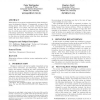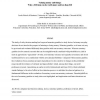97 search results - page 1 / 20 » Are refactorings less error-prone than other changes |
MSR
2006
ACM
13 years 10 months ago
2006
ACM
Refactorings are program transformations which should preserve the program behavior. Consequently, we expect that during phases when there are mostly refactorings in the change hi...
MANSCI
2010
13 years 3 months ago
2010
The study of risky decision-making has long used monetary gambles to study choice, but many everyday decisions do not involve the prospect of winning or losing money. Monetary gam...
TSE
2008
13 years 4 months ago
2008
Current text based Software Configuration Management (SCM) systems have trouble with refactorings. Refactorings result in global changes which lead to merge conflicts. A refactorin...
ICSE
2009
IEEE-ACM
14 years 5 months ago
2009
IEEE-ACM
Much of what we know about how programmers refactor in the wild is based on studies that examine just a few software projects. Researchers have rarely taken the time to replicate ...
CGO
2005
IEEE
13 years 10 months ago
2005
IEEE
Program execution traces are frequently used in industry and academia. Yet, most trace-compression algorithms have to be re-implemented every time the trace format is changed, whi...


